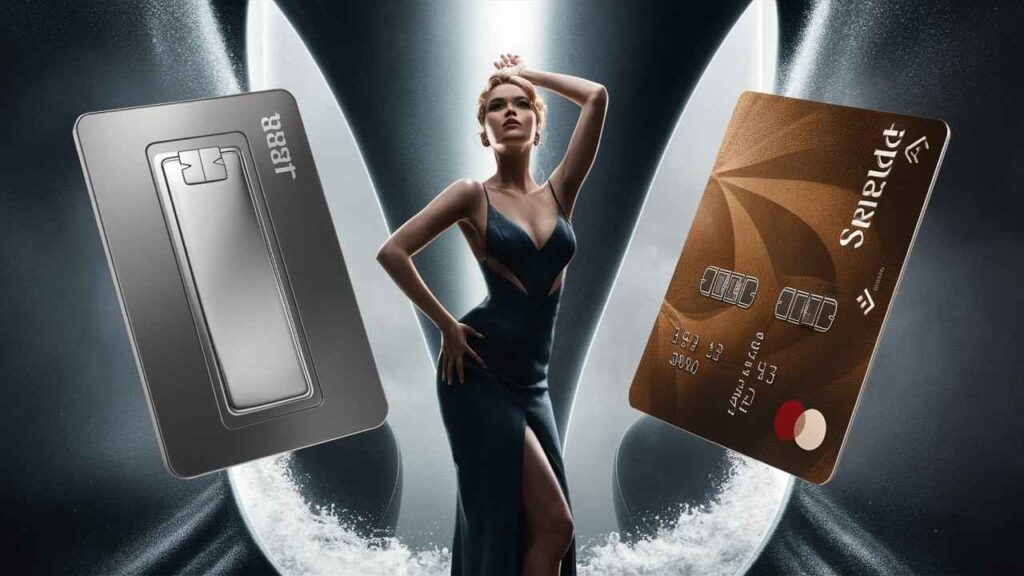The Battle of the Plastic Giants
Let’s face it: deciding between a Debit Card vs. Credit Card is like picking between two equally enticing desserts. One promises responsibility and the other tempts with rewards. But which one deserves a permanent spot in your wallet? With so many nuances between the two, it’s time to break down the age-old debate: debit or credit? Whether you’re building credit or just trying to survive your next shopping spree, knowing the strengths (and weaknesses) of each will help you make an informed decision. So, buckle up💰let’s dive in and settle this once and for all.

The Basics: Understanding the Difference Between Debit and Credit
Debit Cards: Your Bank’s Best Friend
At its core, a Debit Card is your personal money manager. It’s linked directly to your checking account, meaning when you swipe, the money comes straight from your bank balance. No credit, no problem💰your own cash is your limit. Simple, no frills, and💰arguably💰less risky if you’re trying to stick to a budget. But don’t mistake simplicity for dullness; it’s as dependable as your best friend who never forgets your birthday.
Credit Cards: Borrowing with Benefits (and Risks)
Enter the world of Credit Cards: here, you’re borrowing money from your bank with a promise to pay it back later. You’ve got a spending limit, but that limit is based on the bank’s confidence in your repayment abilities. Credit cards aren’t just a tool for buying things💰they’re also a financial product packed with perks (think rewards and cash back). But as with all relationships, there’s a dark side: interest rates and the temptation to buy things you can’t afford. Proceed with caution.

How Debit Cards Work: Money Right Out of Your Pocket
The Magic (or Lack Thereof) Behind Debit Transactions
When you use a Debit Card, there’s no magic involved💰just the cold, hard reality of your account balance. Swipe it, and the money’s gone. No borrowing, no future payments to dread💰what you see is what you get. For those who love the simplicity of knowing exactly where their money is going, debit cards are a no-brainer.
No Credit, No Problem: Your Own Cash is Your Limit
With a Debit Card, you’re essentially living within your means (and that’s kind of a refreshing concept). If you’ve got $200 in your checking account, that’s your spending power. It’s a limit set by you💰no surprises, no confusion. But if you’ve been living dangerously and checking your account balance after every purchase, you might just find yourself face-to-face with an unpleasant overdraft fee.

How Credit Cards Work: Borrow Today, Pay Later
Borrowing Money Like a Boss
Using a Credit Card is like borrowing money from your bank, except you don’t have to beg for it or fill out a form. Instead, you’re trusted to use the card within a preset limit and pay it back by the due date. The real catch? Interest rates. If you don’t pay back what you owe in full, you’ll be charged an eye-watering interest rate. It’s a delicate balance between managing debt and reaping the rewards of spending without immediate consequences.
The Wild World of Credit Limits and Interest Rates
Ah, credit limits. The thing that stands between you and a shopping spree. Your Credit Card limit is determined by your creditworthiness (how the bank feels about lending you money). And if you’re not careful, you’ll find yourself climbing the treacherous slope of high interest rates, which will haunt you for as long as that outstanding balance lingers.

The Pros of Debit Cards: The Responsible Adult’s Choice
No Bills at the End of the Month Sounds Dreamy
One of the key draws of Debit Cards is that they operate on what you actually have. No loans, no surprises, no bills arriving in your mailbox weeks later. You spend today, and you’re done. No need to worry about interest piling up like a snowball on its way to crush your budget.
Budget-Friendly, Literally
If you’re the type who gets a little jittery when you see your credit card statement, a Debit Card can help put your mind at ease. Since you can only spend what’s in your bank account, you’re essentially forced to stay within your budget. It’s a no-nonsense approach to managing your finances that helps keep impulse buys (and buyer’s remorse) to a minimum.💰
Safety Nets: No Debt to Carry Around
The best thing about Debit Cards is that you’re not carrying around a stack of debt like a financial daredevil. When you’re done spending, you’re done. There’s a sense of finality that’s oddly satisfying. Plus, if you’re worried about overspending, many banks will let you link up alerts to notify you when your balance gets low.

The Cons of Debit Cards: Not All Sunshine and Rainbows
Overdraft Fees: Your Bank’s Favorite Way to Say “Surprise!”
The downside to Debit Cards is the ever-looming possibility of overdraft fees. They’re like the financial equivalent of stepping on a Lego💰unexpected and painful. Spend more than you have, and your bank will charge you a fee that will make you question your life choices. No one wants to be hit with that extra charge when your balance is already tight.
Limited Rewards and Perks (Yawn)
Unlike Credit Cards, Debit Cards don’t often come with the kind of rewards or perks that make your heart race. Want cash back or miles for free flights? Sorry, not here. Debit Cards are efficient, but they won’t earn you much beyond your basic purchases.
Less Fraud Protection Compared to Credit Cards
While Debit Cards do offer some protection against fraud, it’s not as robust as the protection you get with Credit Cards. If someone steals your debit card, you could find yourself racing against time to recover your money. With a Credit Card, you’re usually off the hook for unauthorized charges, leaving you more time to panic about other things.💰
The Pros of Credit Cards: Living on the Edge (Responsibly)
Earn Rewards While Spending (Finally, an Upside to Swiping)
If you’re a fan of cashback, rewards points, or even airline miles, Credit Cards are your golden ticket. Spend responsibly, and those little purchases can translate into big rewards. It’s like getting paid for doing something you’d do anyway. Hello, free coffee!
Building Credit Without Breaking a Sweat
One of the most compelling reasons to choose a Credit Card over a Debit Card is its ability to help you build your credit score. With proper management, you can improve your financial reputation, making it easier to get approved for loans, rent apartments, and sometimes even score better interest rates.
Fraud Protection That Makes You Feel Like a VIP
While Debit Cards offer some fraud protection, Credit Cards take it up a notch. If your card gets stolen or used for unauthorized purchases, you can usually get your money back much faster💰and with less paperwork. You’ll feel like a VIP every time you call to report fraud.
The Cons of Credit Cards: Debt’s Sneaky Cousin
Interest Rates That Will Haunt Your Wallet
Credit cards, with all their perks, come with a dangerous downside💰interest. If you don’t pay your balance off in full, interest rates kick in like a monster from under the bed. Those rates can skyrocket, making your “great deal” feel like a financial nightmare.
The Temptation to Overspend (Oops)
Let’s face it: it’s easy to go a little wild with a Credit Card. The convenience of “buy now, pay later” is tempting, and before you know it, you’ve racked up a balance that’s larger than your grocery bill for the month.
Late Fees: Because Why Not Make It Worse?
Forget to make a payment on time? Expect a late fee to appear on your statement, and it’s rarely a small one. These fees can quickly pile up if you’re not vigilant about making payments before the deadline. Credit Cards might be fun in the moment, but they can certainly leave you with a sore wallet later.
Spending Power: Who Has the Upper Hand?
Debit Cards: Keeping You Honest with Your Bank Balance
With a Debit Card, you’ve got a built-in reality check. Every swipe is a reflection of your actual bank balance, making it harder to go overboard. No credit, no extra purchasing power💰just you and your hard-earned cash.
Credit Cards: More Buying Power Than You Might Need
Credit Cards give you more purchasing power than your bank balance may suggest. It’s like an all-you-can-eat buffet where you’re allowed to take more than you can actually pay for. If you don’t manage this power wisely, you might end up with a mountain of debt.
Security Showdown: Which Card is Safer in the Wild World of Fraud?
Debit Card Fraud: A Race Against Time
If someone swipes your Debit Card, you’re racing against the clock. Since your funds are directly linked to your checking account, resolving the fraud can take a bit longer, and you might be left with no money in the meantime.
Credit Card Fraud: You Might Get Your Money Back (Eventually)
With a Credit Card, fraud protection is a bit more generous. You’re not on the hook for the fraudulent charges in most cases, and the process to recover your money is often smoother. That peace of mind can be priceless.
How They Affect Your Credit Score: Building Your Financial Reputation
Debit Cards: No Credit Score Love Here
If you’re looking to build a credit score, a Debit Card won’t do much to help. Since you’re using your own money, there’s no opportunity to show off your responsible borrowing habits to the credit bureaus.
Credit Cards: The Key to a Glowing Credit Score (If Used Correctly)
A well-managed Credit Card can help you build and maintain a healthy credit score. It’s the credit-building tool that opens doors for loans, better interest rates, and financial opportunities down the road. But don’t go maxing out your limit if you want that glowing credit score!
Fees, Fees, and More Fees: Which Card is Really Costing You?
The Hidden Fees of Debit Cards: No One Told You About Those
While Debit Cards seem like the financial knight in shining armor, they do come with their own set of sneaky fees. ATM fees, insufficient funds fees, and even maintenance fees can quickly add up, especially if you’re using an out-of-network ATM or overstepping your balance. These fees may be low on the radar, but they’re sneaky enough to make you question whether you’re getting the best deal.
Credit Card Annual Fees: Worth It or Not?
Many Credit Cards come with annual fees. On the surface, it might seem like a dealbreaker, but sometimes these fees are worth it if the perks they bring outweigh the cost. Think about rewards programs, travel insurance, and other fancy benefits that justify those yearly charges. Just remember to check if those perks will actually make a difference in your financial life.
Overdraft Fees vs. Late Payment Fees💰Who’s the Real Villain?
In the battle of fees, overdraft fees from Debit Cards and late payment fees from Credit Cards are fierce competitors. An overdraft fee is your bank’s way of telling you that you’ve spent more than you’ve got💰hello, surprise fee. On the other hand, a late payment fee is a Credit Card company’s way of punishing you for failing to make your payment on time💰double ouch! Both can sting, so choose your card wisely (and remember to track your payments and balance).
Rewards and Perks: Who’s Got the Better Swag Bag?
Debit Cards: Not Much to Show Here, Folks
When it comes to rewards and perks, Debit Cards simply don’t measure up. They’re more about practicality than making your wallet feel like it’s full of gold. While some banks may offer modest cashback rewards or discounts, don’t expect to earn points for every coffee you buy. With a Debit Card, your wallet stays light on rewards but heavy on simplicity.
Credit Cards: Points, Miles, and Cash Back, Oh My!
Now, Credit Cards are a whole different ball game. With a Credit Card, you can rack up rewards faster than you can swipe the card. From cash back to travel miles to exclusive offers, these cards are designed to make every purchase feel like you’re getting something extra. So, if you’re into earning rewards while spending, a Credit Card is definitely the way to go.
How to Use Each Card: The Ultimate Financial Strategy
Debit Cards: The “I’m Being Responsible” Approach
The Debit Card is the responsible, no-nonsense sibling of the financial family. When you use a Debit Card, you’re essentially saying, “I know exactly how much I have, and I’m not going to risk overspending.” You’re staying grounded and living within your means. If your goal is to maintain strict control over your finances and avoid falling into debt, the Debit Card is a solid choice.
Credit Cards: The “I’m Living on the Edge, but Within Reason” Method
Using a Credit Card is like stepping into a world of possibility and potential danger. It’s the card for the adventurous spender💰someone who wants rewards and perks without sacrificing their financial future. When used responsibly, it allows you to benefit from more spending power, build credit, and earn rewards. Just remember: it’s a fine line between spending smartly and diving headfirst into debt.
Where to Use Each Card: Not All Cards Are Created Equal
Debit Cards: Perfect for Everyday Purchases (But Don’t Try to Rent a Car)
Your Debit Card is your go-to for small purchases and everyday expenses. Grocery shopping? Check. Coffee runs? Check. Paying for your lunch? Check. But when it comes to booking a hotel or renting a car, many businesses may require a Credit Card for the security deposit. Debit Cards are fantastic for day-to-day use, but they have some limitations when it comes to larger transactions or reservations.
Credit Cards: Ideal for Big-Ticket Items and Travel (With Perks Attached)
For big purchases, Credit Cards are your best friend. Whether it’s buying a new laptop or booking a flight, Credit Cards provide that extra layer of purchasing power. Plus, you’re likely to rack up rewards while doing so. From travel points to shopping bonuses, Credit Cards turn major purchases into a lucrative opportunity to earn more.💰
Traveling with Your Cards: The Global Adventure
Debit Cards Abroad: Beware of Foreign Transaction Fees
While Debit Cards are convenient for international travel, beware of foreign transaction fees. These charges can sneak up on you, and before you know it, your bank account is a little lighter. Some Debit Cards waive these fees, but many do not, so it’s crucial to check with your bank before packing your bags. Also, ATMs in foreign countries may charge extra fees, adding another layer of cost to your travels.
Credit Cards Abroad: The Safest Way to Swipe When You’re Globetrotting
On the other hand, Credit Cards are often the preferred choice for international travel. With many cards offering no foreign transaction fees, you can swipe away without worrying about additional costs. Plus, the added security of fraud protection is especially valuable when traveling abroad. And if you’re lucky enough to have a travel rewards card, you can rack up points for flights, hotels, and more.💰
Building Your Budget: Which Card Helps You Stay on Track?
Debit Cards: The Minimalist’s Dream
For anyone who wants to keep their budget simple and straightforward, Debit Cards are a minimalist’s dream. You can’t spend more than you have, making it a practical way to control your spending. If you’re on a tight budget or just trying to avoid debt, Debit Cards provide a straightforward approach to managing your finances.
Credit Cards: The Risky-but-Rewarding Option for the Savvy Spender
If you’re a savvy spender with good discipline, Credit Cards can be a great tool for managing your budget while reaping rewards. You can track your spending, earn rewards, and even build your credit score💰all while spending money you don’t technically have yet. Just remember to pay your bill on time to avoid interest charges and late fees.
What Happens When You Lose a Card? The Safety Net Debate
Debit Cards: What to Do When Your Bank Account’s Exposed
Losing your Debit Card can feel like a nightmare. With your bank account directly tied to your card, someone could have immediate access to your funds. But don’t panic. Call your bank immediately to report the loss, and they will typically freeze your account and issue you a new card. You’re protected by fraud policies, but you may have to wait a little longer to get your money back.
Credit Cards: Steps to Protect Yourself with Minimal Drama
When a Credit Card goes missing, you’re in a slightly better position. Most banks offer zero liability for unauthorized charges, so you won’t be on the hook for any fraudulent activity. Still, it’s important to report a lost or stolen card immediately to minimize risk. Thankfully, Credit Cards often have more robust fraud protection than Debit Cards, which means fewer headaches for you.💰
Debt Dangers: What Happens When Things Go Wrong?
Debit Cards: Your Cash is Still Yours, No Debt Spiral in Sight
One of the most comforting things about using a Debit Card is that you’re not borrowing money. If you make a mistake or overspend, you’re limited to the money in your account. There’s no risk of falling into a debt spiral, as long as you’re diligent about checking your balance. It’s a far safer option if you’re trying to avoid accumulating debt.
Credit Cards: The Slippery Slope of “I’ll Pay It Later”
When it comes to Credit Cards, the slippery slope of “I’ll pay it later” can lead to significant debt. If you don’t stay on top of your payments, those high interest rates can quickly snowball into a financial nightmare. The temptation to delay payments can be strong, but it’s a risky game to play.💰
Who’s Got the Best Customer Support? The Card You’ll Call in a Crisis
Debit Cards: More Limited Help, But Less Drama
Debit Cards typically offer more basic customer support. You can freeze your account or report fraud, but you won’t have the same level of 24/7 access or perks that come with Credit Cards. Still, when the basics are all you need, Debit Card support gets the job done.💰
Credit Cards: 24/7 Support When Your Balance Gives You a Panic Attack
If you’re using a Credit Card and something goes wrong, you’ll often have access to round-the-clock customer support. Need to report fraud at 2 AM? No problem. Facing a panic attack over a high balance? Call them up, and they’ll help you work it out. The level of support is a lot more robust, making Credit Cards the go-to for those who might need a little extra hand-holding.
Which Card Should You Choose: The Final Showdown
When to Use a Debit Card (and Feel Like an Adult)
If you’re looking to keep things simple and avoid accumulating debt, a Debit Card is the way to go. Use it for everyday purchases, sticking to your budget, and feeling like a responsible grown-up. It’s no-frills, practical, and gets the job done.
When to Use a Credit Card (and Earn All Those Sweet Rewards)
If you’re someone who loves rewards, building credit, and the convenience of buying now and paying later, a Credit Card is your ticket to financial freedom (with a little discipline, of course). Just remember to manage your balance wisely, and those rewards will be well worth it.💰
Conclusion: So, Which Is Better for You?
At the end of the day, Debit Card vs. Credit Card is less about finding the winner and more about finding what works best for you. Whether you’re looking for a straightforward spending method or hoping to rack up some sweet rewards, both cards have their advantages. Your perfect card is out there💰just find it, swipe wisely, and enjoy the benefits of your choice.
People Also Ask
Can I use a debit card anywhere a credit card is accepted?
Yes, you can use a Debit Card at most places where a Credit Card is accepted, including online and in-store purchases. However, certain services like hotel bookings or car rentals might prefer Credit Cards due to security deposit requirements.
Which is better for online shopping: debit or credit card?
For online shopping, Credit Cards tend to be better due to enhanced fraud protection and the ability to dispute charges more easily. Debit Cards are also an option but may offer fewer protections in case of fraud.
Does using a debit card help build credit?
No, using a Debit Card does not affect your credit score or help build credit. This is because Debit Cards are not reported to credit bureaus, and you are spending your own money rather than borrowing.
What are the fees associated with debit cards vs. credit cards?
Debit Cards may have fees for overdrafts, out-of-network ATM withdrawals, and maintenance. Credit Cards can have annual fees, interest charges, late payment fees, and foreign transaction fees, which can be higher if balances are not paid off in full.
How do debit card transactions affect my bank account?
With a Debit Card, transactions immediately deduct money from your bank account. This means you are spending your own funds, and your available balance will decrease as you make purchases.
Is it safer to use a credit card than a debit card?
Yes, Credit Cards tend to offer better fraud protection compared to Debit Cards. If your Credit Card is used fraudulently, you can typically dispute the charge and avoid paying. With a Debit Card, the stolen funds are taken directly from your bank account and may be harder to recover quickly.
Can I overdraw my account with a debit card?
Yes, you can overdraw your account with a Debit Card, especially if you have overdraft protection. However, your bank will usually charge an overdraft fee for the transaction. If you don’t have overdraft protection, the transaction will simply be declined.
What happens if someone steals my debit card vs. my credit card?
If your Debit Card is stolen, your funds are at immediate risk, and it’s essential to report it right away to limit potential loss. Credit Cards offer better fraud protection, and unauthorized charges are typically easier to dispute, with less risk to your personal funds.
Are there rewards programs for debit cards like credit cards have?
While Credit Cards often offer robust rewards programs (cash back, travel miles, etc.), Debit Cards typically offer fewer or no rewards. Some banks may offer basic rewards for Debit Card purchases, but they’re usually less lucrative than Credit Card rewards.
Which is better for travel: debit card or credit card?
Credit Cards are generally better for travel due to added fraud protection, travel insurance benefits, and no foreign transaction fees on some cards. Debit Cards may also be used, but they might come with foreign transaction fees and fewer perks.
What is the interest rate difference between debit and credit cards?
Debit Cards do not have an interest rate because they are tied to your bank account, and you’re spending your own money. Credit Cards, on the other hand, often have interest rates that apply when balances are carried month-to-month, which can range from 15% to 25% or higher depending on your credit score.
Do debit cards have spending limits like credit cards?
Yes, Debit Cards do have spending limits, but they are usually determined by the available balance in your bank account. Credit Cards have a pre-established credit limit, which is the amount the credit issuer is willing to lend you.
Can I rent a car or book a hotel with a debit card?
It is possible to rent a car or book a hotel with a Debit Card, but many rental car companies and hotels prefer Credit Cards. Some might place a hold on funds, which can limit your available balance, and some services may charge additional fees for Debit Card use.
What are the pros and cons of using a debit card vs. a credit card?
Debit Cards offer a straightforward way to manage spending and avoid debt, but they don’t build credit and offer fewer rewards. Credit Cards can help build credit, offer rewards, and provide fraud protection, but they carry the risk of overspending and accruing interest if balances aren’t paid off.
How do credit cards and debit cards affect budgeting differently?
Debit Cards help you stick to a budget by limiting spending to the available balance in your account. Credit Cards can offer more flexibility and rewards but may lead to overspending if not monitored carefully, potentially leading to debt accumulation.
Do debit cards offer purchase protection like credit cards?
Debit Cards generally do not offer the same level of purchase protection as Credit Cards. Credit Cards often come with extended warranties, purchase protection, and the ability to dispute charges if something goes wrong with a purchase.
How do credit card and debit card fraud protections differ?
Credit Cards offer stronger fraud protection compared to Debit Cards. With a Credit Card, you’re usually not liable for unauthorized charges, and your credit card issuer will often handle disputes. For Debit Cards, the stolen money is typically withdrawn from your bank account, and it may take time to resolve.
Which card is better for emergencies: debit or credit?
A Credit Card is generally better for emergencies, as it provides access to funds you don’t currently have. Plus, Credit Cards offer better fraud protection, and the option to pay over time can help you manage unexpected expenses. Debit Cards require having the funds available in your account.
Should I carry both a debit and a credit card?
Carrying both a Debit Card and a Credit Card can provide financial flexibility. Use the Debit Card for everyday purchases and budgeting, and the Credit Card for larger purchases or situations where you want to earn rewards or need extra protection.









